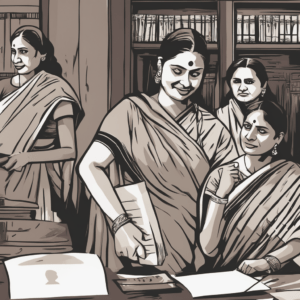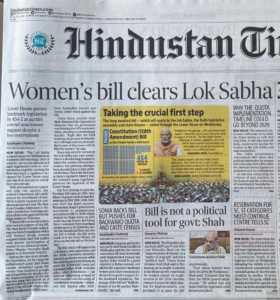The Women’s Reservation Bill (2023)
The proposed Women’s Reservation Bill is a legislative initiative in India that aims to allocate 33% of available positions in state legislative assemblies and the Lok Sabha exclusively for women. Despite being deliberated for over two decades, it is yet to be enacted as law and see the light of the day. The bill represents a significant endeavor to improve female representation in elected bodies and address gender disparity in Indian society. In the realm of legislative matters, there exists an ongoing discourse surrounding a particular piece of statutory enactment. This contentious legislation finds itself at the heart of a fervent debate, with one faction vehemently championing its adoption, while another faction vehemently opposes it. Their opposition is rooted in profound concerns regarding the potential encroachment upon the sacred principle of equality, a foundational tenet of our democratic society.
The Women’s Reservation Bill has historical roots in the early days of the Indian independence movement, with the Indian National Congress passing a resolution advocating for the reservation of legislative seats for women in 1919. The inaugural instance of a bill of this nature made its debut in the Lok Sabha back in 1989. A committee under the leadership of Shanta Kumar proffered a recommendation in 1993, proposing a substantial transformation in the composition of both the Lok Sabha and state legislative assemblies. Their proposition advocated for the allocation of a significant share, precisely 33%, of the seats for women. Despite receiving an endorsement from the Rajya Sabha in 2010 and garnering support from diverse political factions and advocacy groups championing women’s rights, this bill has thus far eluded ratification within the halls of the Lok Sabha.
The question of whether reservations should be extended to encompass other marginalized segments of society, including but not limited to the OBCs and the Muslim community, constitutes a multifaceted and contentious subject matter. In this intricate discourse, arguments both in favor of and against such expansions of reservations are articulated with passion and conviction.
While a substantial portion of women in India faces educational disparities, the potential advantages of women’s reservations extend even to those without the privilege of formal education. Women’s reservations can create awareness about the significance of female education, facilitate the emergence of a more gender-inclusive political landscape, and empower women and girls.
The authenticity of political parties’ commitment to the Women’s Reservation Bill in India is multifaceted and intricate, with evidence on both sides. However, the burgeoning movement in India demanding the bill’s enactment is spearheaded by women’s advocacy groups and civil society organizations, exerting pressure on political parties to endorse and effectively implement the bill.
The 2023 Women’s Reservation Bill cannot be implemented without data from the 2021 Census and the finalization of parliamentary constituency delimitation. These processes provide the requisite data and framework to ensure equitable female representation within the Indian Parliament. By awaiting accurate population data and constituency boundary adjustments, the government can effectively allocate reserved seats, upholding democratic ideals of gender equality in India. The Census 2021, when operationalized, will provide up-to-date data vital for informed decision-making regarding the Women’s Reservation Bill, while the delimitation of parliamentary constituencies ensures that each constituency represents an equivalent number of voters.
The dearth of women’s representation in the realm of Indian politics can be ascribed to a myriad of intricate factors. These encompass the pervasive discrimination against women entrenched within the political arena, the disheartening climate that dissuades women from active political engagement, and the palpable educational disparities existing between men and women. Nevertheless, it is imperative to acknowledge that history bears witness to the illustrious presence of formidable female parliamentarians who have graced the political stage. The likes of Indira Gandhi, Vijayalakshmi Pandit, Sushma Swaraj, and Sonia Gandhi serve as luminous exemplars, underscoring not only the competence but also the inherent entitlement of women to partake in the realm of politics.
In conclusion, the Women’s Reservation Bill represents a significant legislative endeavor in India to address gender disparity in elected bodies. While it remains a contentious piece of legislation, its potential advantages extend beyond formal education and can create a more gender-inclusive political landscape, empower women and girls, and ensure equitable female representation within the Indian Parliament. The bill’s implementation awaits the completion of the 2021 Census and parliamentary constituency delimitation, highlighting the importance of accurate population data and constituency boundary adjustments in upholding democratic ideals of gender equality in India.
There are numerous welfare schemes and DBT schemes in India; all presently managed per the Census 2011 data. The Direct Benefit Transfer (DBT) scheme is a significant initiative of the Government of India to transfer subsidies (scholarships, pensions, and support for LPG, food, and fertilizers) directly to beneficiaries’ bank accounts. The Official Website of DBT lists as many as 313 DBT schemes from 53 ministries. Apart from DBT schemes, several other welfare schemes are currently being implemented in India. If all these schemes now are based on the 2011 Census, can Women be given reservations also based on the 2011 Census? It is a moot question. Can we have quota-within-quota? Or till the 2021 Census is conducted, will our Political Parties advocating and supporting the Women’s Reservation Bill (2023) give 33% of tickets to women in their parties? The Women’s Reservation Bill was passed with 2/3rd majority in the Lok Sabha on 20th September 2023.





